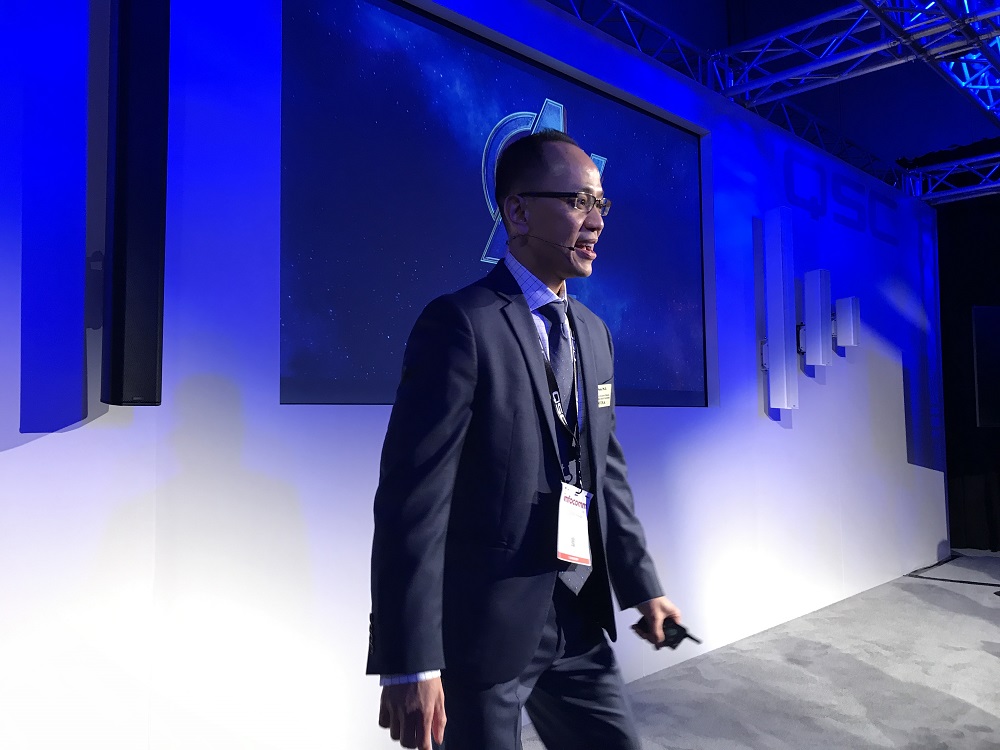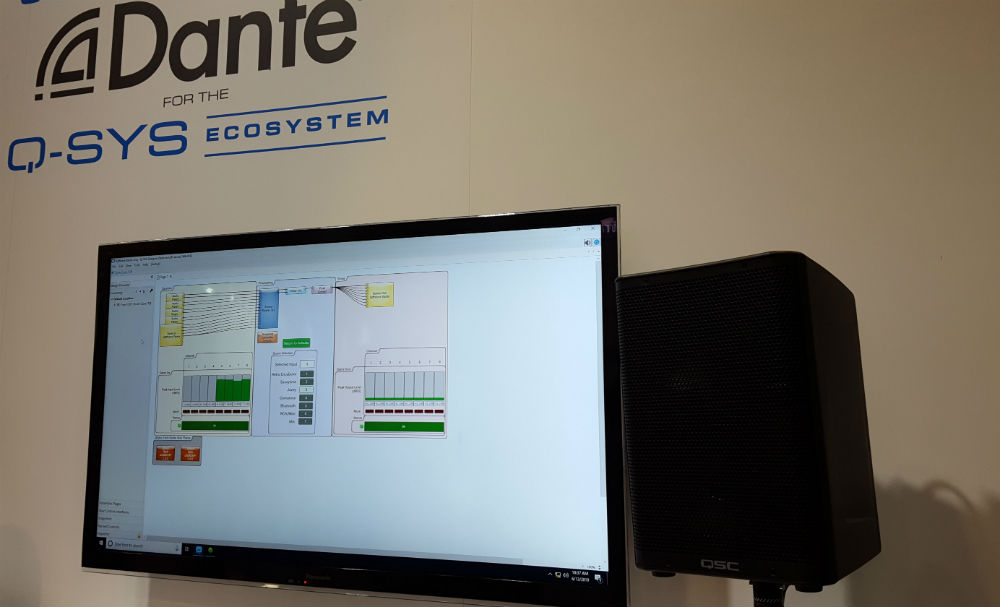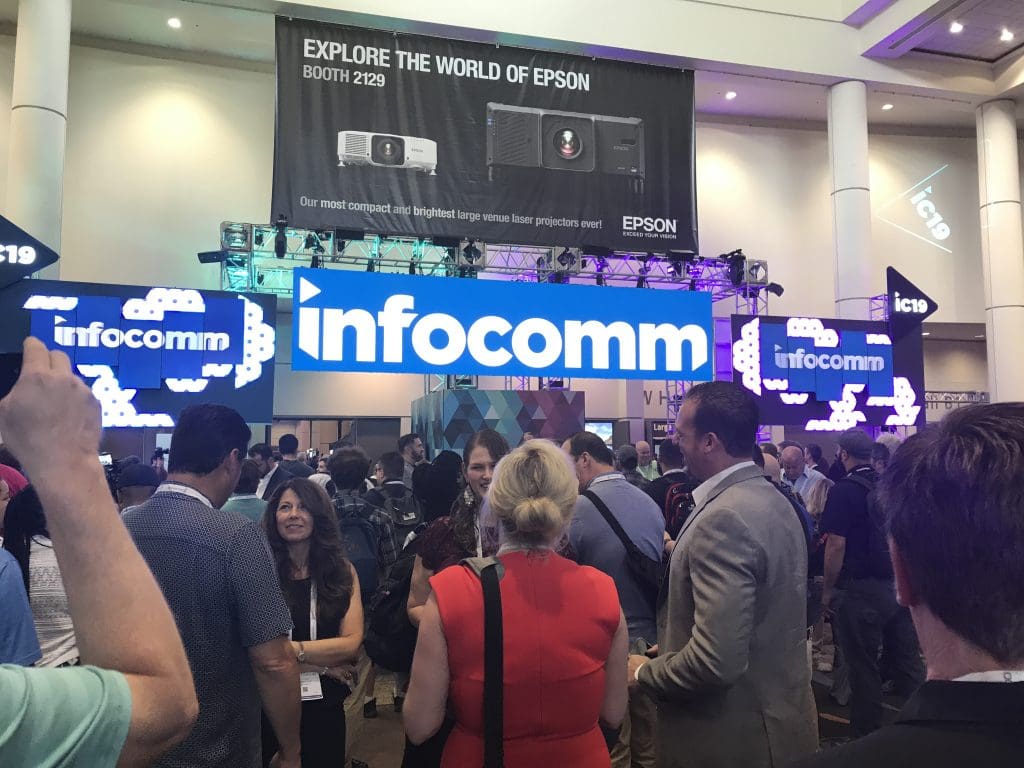During InfoComm 2019, QSC president and CEO Joe Pham delivered a bold and remarkable presentation to a crowded but intimate gathering of integration firm executives, fellow solutions providers and AVIXA brass – including executive director David Labuskes.
Pham, chairman of the AVIXA board, issued challenges – albeit, in a good-natured way — to an AV integration market that he contended needs to evolve. Those in the room seemed to lean forward during the entire 60-minute presentation as Pham identified areas in which the industry is following behind and pointed to steps he believes need to be taken.
However, most of InfoComm 2019’s 44,077 registered attendees and the balance of the AV integration industry weren’t among QSC’s select audience. So below, we’ve tried to boil down some of the greater points made in Pham’s extraordinary presentation.
Identify What’s Truly Important
Many folks in the integration industry remember when Pham went on a “Game of Thrones” kick a few years ago. During some long flights traveling to and from Dubrovnik, Croatia, Pham did some binge-watching and was hooked. Of course, he couldn’t help but draw a correlation between the show’s narrative and that of the integration market.
[related]During his InfoComm 2019 presentation, Pham revisited that theme. “We as an industry, we spend time and energy talking about which product is better than which product,” Pham said. “This spec is better than that spec. This protocol is better than that protocol. Actually, none of it really matters. That was the whole analogy with the “Game of Thrones.”
“There were so many people fighting and bickering and just going after different kingdoms, and none of it really mattered because … all that really mattered in “Game of Thrones” was that winter is coming.”
QSC’s Joe Pham contends that the AV industry tends to get it its own way by spending time on focuses that are ultimately irrelevant.
AVIXA’s ‘Exceptional Experience’ Is Real
AVIXA board member Pham with Labuskes in the audience nodding approvingly emphasized the AV integration industry’s unique opportunity to do much more than just make things work – but to provide the “exceptional experience” that AVIXA has projected as a big part of the industry’s value.
Pham gave the example of attending the world premiere of Avengers: Endgame, a production for which QSC provided the technology. “This was truly an exceptional experience,” he said.
“One of the things in the AVIXA framework is bringing together space, content and technology to deliver the exceptional experience. This space was amazing. It was a complete transformation of the Los Angeles Convention Center into the largest movie theater in the world.”
Pham argued that the AV integration industry has great power but hasn’t learned to use it properly.
The point, though, wasn’t to highlight QSC’s involvement in the blockbuster event (or at least it wasn’t the main point).
The main point was that while Pham was considering the “exceptional experience” in the context of the film he connected the infinity stones or gems that represent wisdom and power in the Avengers universe.
“I’m thinking exceptional experience AV. I’m thinking this is the AV journey that we’ve been on. As an industry, we have found infinity stones. Maybe we haven’t harnessed them to the full power, but we have found infinity stones.”
Pham said that the AV integration industry needs to harness these infinity stones with the objective “not to rule the universe” but “to deliver the exceptional experience because as AV professionals we are passionate about what we do.”
Much like a super hero’s origin story, Pham argued that the AV integration industry has great power but hasn’t learned to use it properly. “We know the magic of what happens when AV is able to connect a performer to the audience, a colleague in one country to a colleague in another country, a father to daughter,” he said.
“We have something so unique and special to bring to the world, but yet we’re not doing it consistently. Why is it that that exceptional experience doesn’t happen every day, all day every day in our world?”
One AV Industry Infinity Stone Represents ‘Talent’
Recruiting top talent is rarely easy but the AV integration industry is uniquely challenged when it comes to onboarding its next generation of innovators. This has been well documented by the industry and by Commercial Integrator. Pham seemed to validate that emphasis by naming talent as an “infinity stone” for the AV industry.
“I actually think that we have to reinvent what it means to be an AV professional,” Pham says. “I think we have to reinvent what it is our industry represents.”
“The first gem in our industry is talent. Everybody’s talking about talent,” he said.
“Here’s the deal. The talent that is needed to create and innovate is different than the talent that is needed to advance something. That is very different than the talent that is needed to reinvent something.
“That’s where I think we are as an industry. I actually think that we have to reinvent what it means to be an AV professional. I think we have to reinvent what it is our industry represents. How do you reinvent an industry?”
Well, it’s hard to reinvent an industry on your own. QSC’s Joe Pham suggested starting with what you can control – your own company. He talked about QSC’s evolution and that the last 15 years have been spend reinventing the company. He recognized that talent needs changed during each phase of QSC’s evolution.
“What can you do in your firm to reinvent your firm?”
Software Is an AV Industry Infinity Stone
One aspect of reinventing QSC was transitioning from a product maker to a software and cloud solutions provider. Meanwhile, Pham says software is another AV integration industry infinity gem.
But it’s not as simple as exiting the hardware business and entering the software world.
Related: QSC Intros Software-Based Dante for Q-SYS EcoSystem
“I’m not saying we don’t need hardware in devices. Clearly we do,” Pham says.
“Unless you can tell me how I can virtualize 130 loudspeakers and a million watts of amplification, we’re going to need hardware devices, but an industry that has centered itself around hardware devices its entire history is missing out on a huge opportunity because software, when brought together with hardware, that’s where the magic happens. That’s where it becomes a living system that grows with the customer over the customer lifetime.”
Pham referenced a 2011 article by Marc Andreesen, “Why Software Is Eating the World.” In the timeless article, Andreesen “basically makes the argument why companies in every industry need to assume that a software revolution is coming,” he said. “He goes through all these examples — Spotify, Google, Amazon, Netflix, Salesforce.”
History has proven Andreesen’s 2011 article prophetic, but Pham argued that it somehow hasn’t penetrated the AV industry. “We’re just not there. We have to get there. We will get there.”
Moving from Products to Ecosystem
Yet another infinity gem for the AV market is what Pham calls ecosystem, but really it’s a comment on platforms versus products.
“A product in isolation has no life. It’s dead. It has no heartbeat,” he argued to an audience that included many product makers. A platform, on the other hand, “is a collection of products integrated together in an intelligent way, coupled with software to create a living platform that grows with [the client] over the lifetime of that platform. Now we have life.”
Related: Audinate Announces Partnerships with Zoom, QSC
The platform, he added, is the basis for solutions that will evolve with customers needs instead of becoming irrelevant in three years. “An ecosystem is just platforms that are connected to other platforms,” Pham said.
“Now you have an ecosystem of connected platforms. Now we’re really talking. Now we’re really talking. This is the world that we live in. I believe AV has to get to this world.”
Of course, the very nature of a platform or ecosystem is that things work together. That sort of challenges the perceived value of an “integrator” if elements of an ecosystem already easily integrate.
“Maybe 20 years ago that was valuable … 10 years ago, arguably valuable,” Pham said.
“Today, I think it’s irrelevant because even when you take these disparate things to make it work together, they work together at the time of installation, and it’s not a living platform that grows with the client. This is a bit backwards. It’s a bit backwards as an industry.”
Big Data Is a Big Infinity Stone
The software world and ecosystems that QSC’s Joe Pham suggests the AV industry joins bring with them big benefits to customers in the form of big data. That, he said, is another infinity gem for the AV industry. Pham rattled off terms:
- “Humanized big data”
- “Metadata management”
- “Artificial intelligence”
- “Augmented reality”
- “Predictive analytics”
- “Deep Learning”
- “Neural networks”
- “Machine learning”
Harnessing all the data that’s available these days is not only a big task but it’s a big priority, he added. It’s such a priority that it led to Google acquiring Nest, he speculated – much to the delight of Google representatives in the back of the room.
The opportunity for the AV industry is obvious, Pham added. At InfoComm 2019 the AV industry is at a place where systems are reaching into data.
“What they’re doing is capturing all that data,” he said. “They understand now your behavior in your home. They understand behavior in millions of homes.
“They connect that data through their analytics engine. Now they understand behavior of human being in homes. That is powerful. $3.4 billion worth powerful. That’s pretty remarkable. There’s got to be something here.”
The opportunity for the AV industry is obvious, QSC’s Joe Pham added. At InfoComm 2019 the AV industry is at a place where systems are reaching into data and “for the first time we have really solid AV management systems that are getting access to data,” he said.
“When you have access [to] data, if you put a little thinking behind it, you can turn data into information.
Then, of course, “you can turn information into knowledge” and “you really understand customer needs.”
That point seemed to boil down Pham’s presentation – perhaps warranting an infinity gem of its own. His challenge to the InfoComm 2019 attendees in the room was to better understand where our customers are going and figure out how to get the integration industry to a place where it provides not just logical solutions but exceptional experiences.
Taken the point one step further – the AV integration industry isn’t there yet. Otherwise, Pham’s extraordinary presentation, which was loaded with calls to action, wouldn’t have been necessary.












